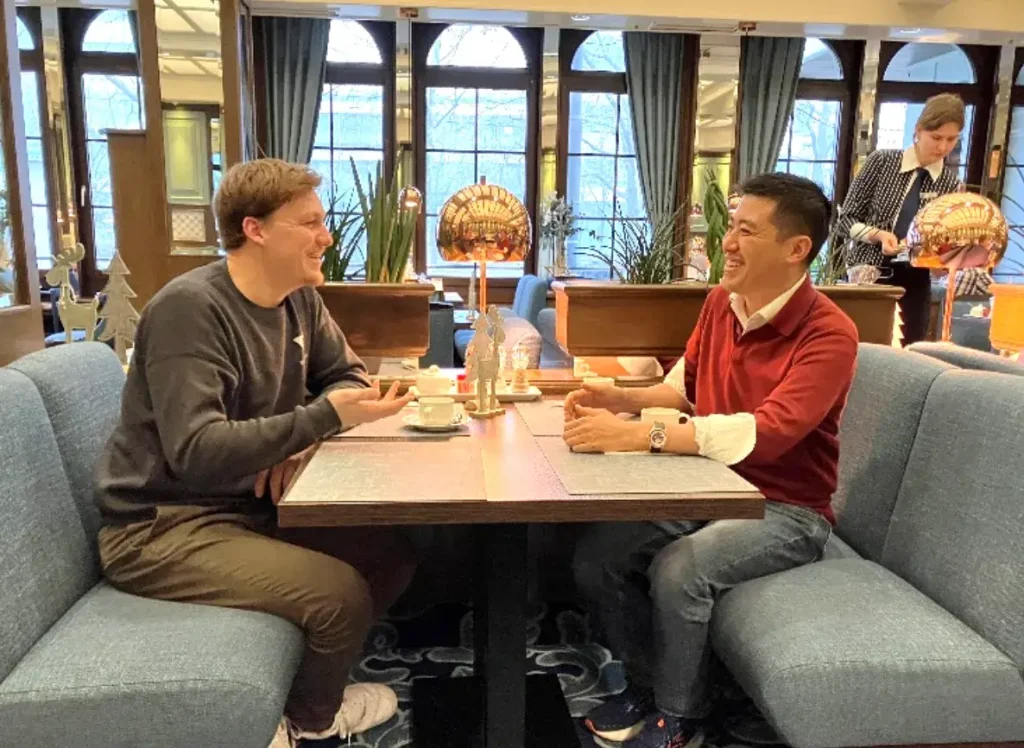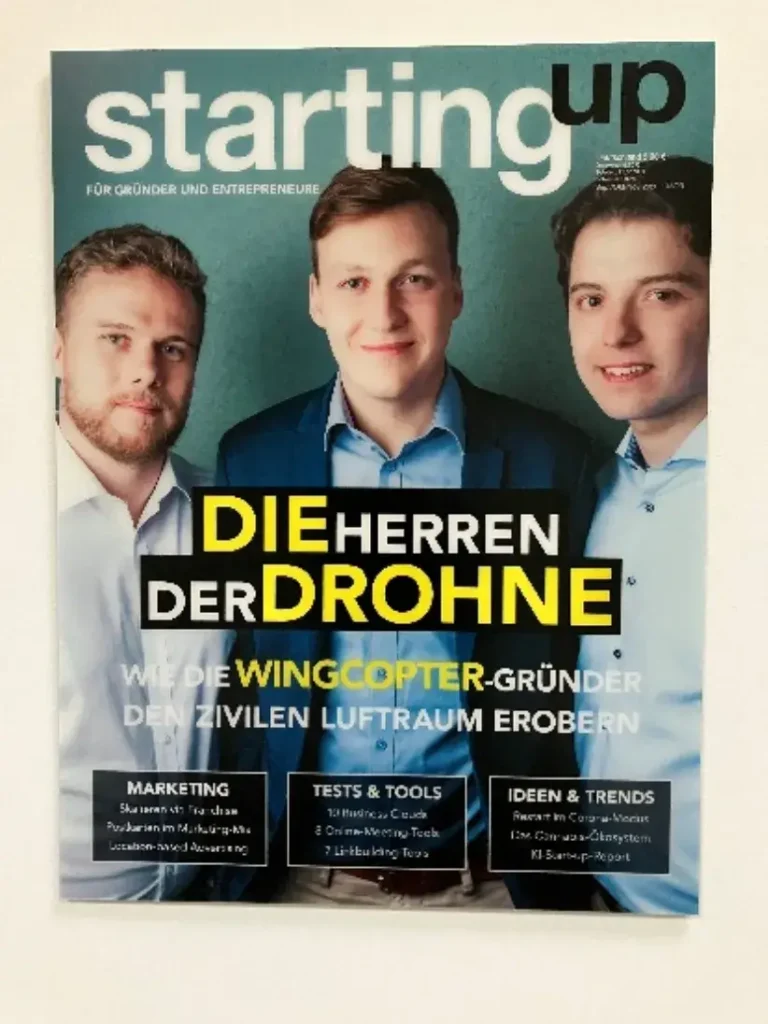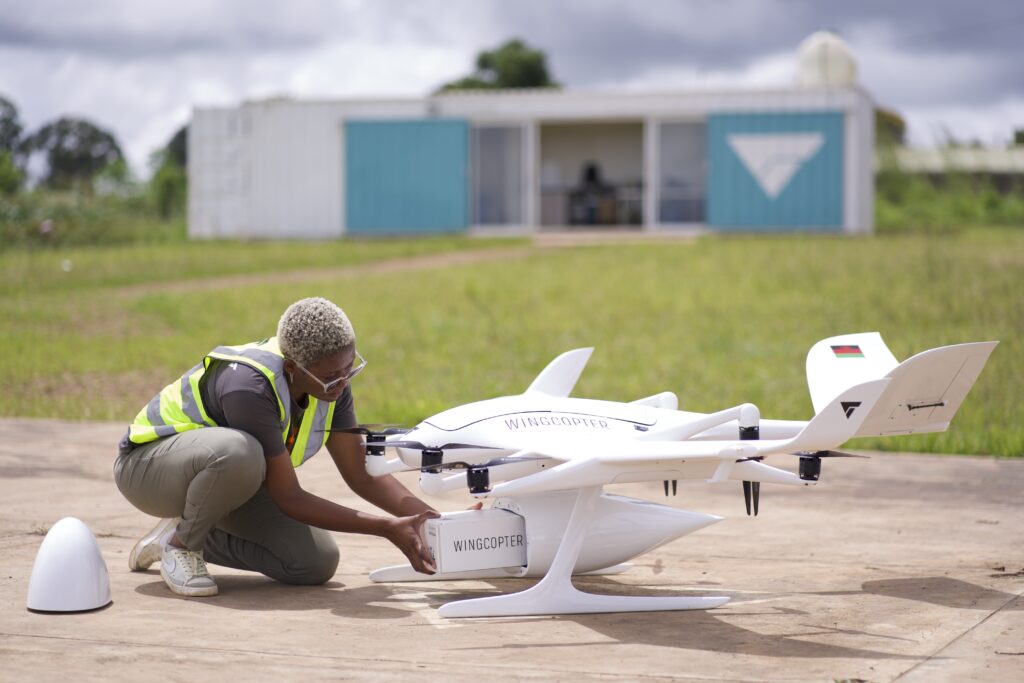
Interview with Tom Plümmer, Co-founder and CEO of Wingcopter
From Idea to Entrepreneurship with Global Impact
Yoshinobu Nagamine:
Tom, thank you for taking the time for this interview. Could you briefly introduce yourself to our readers? You are the Co-founder and CEO of Wingcopter, a Germany-based company pioneering humanitarian and commercial drone delivery. Your mission is to save lives and improve quality of life through drone logistics, and you have successfully raised over $100 million in funding. Additionally, in 2023, you were selected as a Young Global Leader by the World Economic Forum. Could you share your journey and mission with us?
Plümmer:
Yoshi, thank you! I’m honored to be here.
My journey has always been driven by a passion for making an impact. I spent two years in Ghana, where I witnessed firsthand the challenges faced by rural communities with limited access to healthcare and essential infrastructure. One experience that stayed with me was when a neighbor’s child passed away from a minor fever simply because the necessary medicine was unavailable. That profoundly impacted me.
After returning to Germany, I reflected on how I could use my skills in filmmaking, design, and communication to create change.
Living in Ghana taught me resilience, positive thinking and the importance of empowering local communities. I worked with children, teaching filmmaking to support them document their challenges, like the poor conditions of public toilets, devastating environmental pollution due to the lack of a waste recycling system or limited access to education as money was missing for school fees. On a positive note, one project showed the children how much influence a film can have when the village chief decided to have the beach cleaned as a result of a documentary the children had made which included the polluted beaches as one of the topics for which they wanted change. This reinforced my belief in empowering people with tools and knowledge to create their own solutions. Ghana was more than an experience; it was a lesson in humility, creativity to make a difference, and the strength to follow a purpose with passion.

Nagamine : How old were you then when you went to Ghana?
Plümmer: I was 19 years old and went back at 22. At 25 I founded my first company.
Nagamine: That’s remarkable at such a young age. What inspired you to become an entrepreneur? Was it formal education, or did you learn in a more informal way?
Plümmer: My time in Ghana was a turning point. It showed me the gap between technology and real-world problems, inspiring me to bridge that divide. I wanted to create solutions that save lives and make a tangible impact. Formal education played a role in shaping my skills, but much of what I’ve learned has come from practical experience and informal resources, like podcasts and self-study as well as learning by doing. For instance, since many years and until today I listen to a podcast called “The Twenty Minute VC (20VC) ” by Harry Stebbings religiously. It’s funny because one day I realized I’d raised millions using tactics I’d picked up from a cool dude and his guest speakers just by listening to them. I hope he doesn’t want a commission now (laughter). Passion, drive and purpose have always been my strongest motivators. To me, becoming an entrepreneur wasn’t about chasing wealth. It was about creating solutions to problems that shouldn’t exist in today’s world. When I think about entrepreneurship, I think about the people whose lives you’re aiming to improve sustainably.
The Founding of Wingcopter

Nagamine:
Tell us about the founding of Wingcopter. How did you meet your co-founder, and what is the company’s vision?
Plümmer:
Meeting my co-founder and inventor of the Wingcopter tilt-rotor unmanned aircraft, Jonathan Hesselbarth, was the starting point of my journey as an entrepreneur. He is a brillant engineer and at the time was workign on novel drone prototypes which impressed me a lot.
I saw in his inventions the chance to solve the problems I was confronted with in Ghana. While he focused on the technology, I brought the vision of using drones for impact through purposes. Within a week of meeting, we decided to pursue the journey of Wingcopter together. Combining our strengths—his technical expertise and my drive to create impact at scale —allowed us to build a company addressing real-world problems.
Our early days were fuelled by a mix of naivety and relentless determination. We knew what we wanted to achieve, even if we didn’t always know how to get there. That’s the beauty of starting small—every milestone feels monumental and therefore motivating.
In the early days, we had a mix of ignorance and relentless determination. We didn’t always know how to achieve our goals, but we were crystal clear on what we wanted to accomplish. That is the beauty of starting small—every milestone carries great significance.
Challenges of a Startup
Nagamine:
What were the biggest challenges in your entrepreneurial journey? The drone industry seems particularly risky—what setbacks did you face, and how did you overcome them?
Plümmer:
The biggest challenge has been navigating the highly regulated commercial aviation industry, which requires significant time, resources, and R&D to create something truly innovative. Revolutionizing the market, rather than copying existing solutions, takes years of effort. Unfortunately, many investors are impatient and seek immediate returns, which can be tough during the R&D phase.
After a decade of over €100 million in investment, flight and bench testing, and real-world trials, we’re now ready to move into the commercialization stage with our Wingcopter 198 and scale globally. The next five years will focus on bringing our world-class drone solutions to market and making a global impact.
Our journey stands out because, unlike many startups, we bootstrapped for the first four years, borrowing €20,000 from our parents and working relentlessly to build drones and generate revenue. This allowed us to grow organically and retain control. We avoided early-stage investors who offered unfavorable terms, which would have hindered our vision.
Once we gained traction, we raised €60 million in a Series A round, with an additional €40 million from the European Investment Bank. Scaling globally will require hundreds of millions more, but the challenges we’ve faced have made us resilient and prepared for the next phase.
The Role of Drones in Global Challenges
Nagamine:
How do drones address global challenges, and why do you focus on last-mile delivery, particularly in low- and middle-income countries?
Plümmer:
Drones are game-changers in logistics, particularly for last-mile delivery. They fill critical gaps caused by infrastructure shortages and provide fast, reliable transport. In developed countries, traffic congestion can delay deliveries, but in rural areas of Africa or Southeast Asia, poor infrastructure means medical supplies take days to arrive. Drones offer a faster, more dependable alternative.
For example, imagine a mother in a remote village who urgently needs oxytocin to stop postpartum bleeding. A drone can deliver the life-saving drug within minutes. That is why we focus on medical logistics. But drones are not limited to healthcare—they can also tackle hunger, education, and climate challenges.
As we often say, “We are not just flying drones—we are flying opportunities.”
Future Applications of Drones
Nagamine:
Beyond medical logistics, what potential applications do you see for drones in the future?
Plümmer:
The possibilities are limitless. We envision a drone network becoming a highway in the sky. Apart from medical logistics, drones can be used for grocery deliveries, e-commerce, wildlife conservation, and even middle-mile logistics. For example, in Japan, we are exploring partnerships for delivering groceries to remote islands.
As technology advances, it will be possible to develop larger drones capable of carrying heavier loads over longer distances.
The regulatory framework will be a crucial factor shaping future drone applications. The technology is already ready, but clear guidelines are needed to ensure safe and efficient operations in urban areas. This process can be challenging, but safety and regulatory compliance are non-negotiable. We are also looking into integrating renewable energy solutions into drone logistics—such as hydrogen-powered systems. Expanding technological frontiers while ensuring sustainability is our ultimate goal.
Synergies, Partnerships, and Growth
Nagamine:
Wingcopter’s success in Germany is no coincidence. Could you elaborate on the synergies between the drone and automotive industries?
Plümmer:
Absolutely. One of Wingcopter’s unique strengths is its ability to leverage Germany’s rich automotive history. Germany is home to Daimler and Volkswagen, companies known for mass production and durability—principles we have applied to the aviation industry.
For example, automobiles must withstand harsh conditions daily. We have incorporated that durability into drone manufacturing. Our team includes experts with decades of experience in both the automotive and aerospace industries, bringing invaluable insights into scalability and efficiency.
We are also preparing for mass production. New senior team members, who have built factories in Southeast Asia and Latin America, will help us industrialize our operations. This cross-industry knowledge is what sets Wingcopter apart in the global market.
Nagamine:
Your work in Japan, particularly with ANA (All Nippon Airways) and the Japanese Red Cross, seems to reflect this innovation.
Could you tell us more about your partnerships in Japan?
Plümmer:
Japan is a great example of how we combine innovation with local partnerships. Itochu Corporation has opened many doors for us, including collaborations with ANA and the Japanese Red Cross. We conducted trial deliveries of blood and medical supplies to remote areas like Okinawa. This partnership has since expanded into grocery delivery, demonstrating the versatility of our technology.
Our success in Japan is built on cultural understanding and collaboration. By working with local stakeholders, we can tailor solutions to specific community needs.
For example, we train local teams in drone operation and maintenance, ensuring long-term impact. After one successful trial, an 80-year-old resident in Okinawa applauded, saying, “This makes life easier for us.” Moments like these remind us why we do this work.
Challenges in Scaling the Business
Nagamine:
What challenges have you faced in expanding your business?
Plümmer:
Scaling a drone business is no easy task.
One of the biggest hurdles has been navigating regulations.
Each country has different rules, requiring time and resources for compliance.
Convincing investors to support a long-term vision has also been challenging. In the early stages, we had to self-fund, which meant working long hours and being extremely resourceful. Another challenge was ensuring our technology could perform in diverse environments.
We tested our drones in 16 countries, including deserts with sandstorms and rainforests with constant downpours. Each environment presented unique lessons, shaping the reliable systems we deploy today.

My Philosophy
Nagamine:
Tom, you seem to have a unique ability to bring experts and stakeholders together.
Plümmer:
Building a business, selling a product, and succeeding in any venture all come down to one key factor—empathy.
Nagamine:
That’s an interesting perspective. What exactly do you mean by empathy?
Plümmer:
Empathy isn’t just something you force yourself to develop for the sake of sales. It is about how you were raised, your relationships with parents, friends, and colleagues, and whether you have cultivated a deep understanding of others. Unfortunately, some people have never had the influences needed to develop empathy.
Empathy is the key to success. If you truly understand what your customers or patients need, you can deliver the right solutions. For example, a mother giving birth in a hospital doesn’t care about how advanced our drone is—she just wants her medical supplies delivered on time. If the drone is late or fails to deliver what she needs, it doesn’t matter how sleek or innovative it looks—it’s a failure.
Message to Readers
Nagamine:
Finally, do you have a message for our Japanese readers and aspiring entrepreneurs?
Plümmer:
First of all, Arigato gozaimasu! I love Japan—every visit leaves me deeply impressed by the incredible hospitality and attention to detail. The beautiful gardens, amazing cuisine, and warm people all reflect Japan’s spirit of care and precision. No matter how many times I visit, I always feel a sense of wonder and admiration.
From Wingcopter’s perspective, Japan holds enormous potential. Japanese society is highly receptive to innovation and transformation, especially in elderly care.
For example, in the Goto Islands, we have tested drone deliveries for newspapers, groceries, and medicine.
Seeing elderly residents embrace technology has been incredibly heartwarming. Even people over 80 enjoy receiving their newspaper in the morning, medicine in the afternoon, and groceries in between—all delivered by drone. Their quick adaptation to this technology is truly inspiring.
Whenever we host press conferences or produce short videos, the whole community gets involved, and their enthusiasm never fails to amaze me.
We want to achieve even more in Japan and hope that both younger and older generations will join us on this journey. At Wingcopter, we believe in sharing knowledge, creating local jobs, and fostering collaboration through networks. If anyone is interested in getting involved in our mission as we expand in Japan, there are many ways to do so—through Itochu Corporation or our careers page on our website.
We are still a small company, so we can’t make big promises, but our ambition is clear— we aim to become the global leader in this industry and are always open to great partnerships and talent.

Nagamine:
Tom, thank you very much. That was truly fascinating.
Thanks to drones, “The sky is no longer the limit.”
Perhaps the next step is the stars?
Plümmer:
Exactly! Now, even the galaxy is the limit! (laughs)
Yoshi, thank you again—this interview was truly enjoyable.